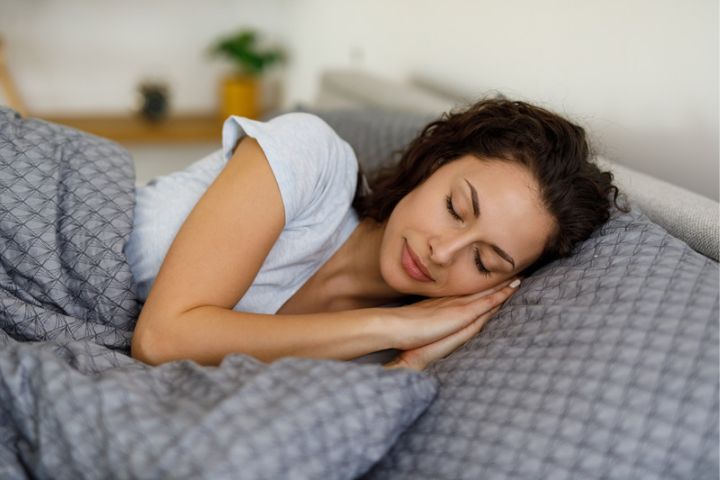

5 ways to unlock your body's full potential and get a better sleep
Getting a good sleep at night is crucial for your health, especially in today's fast-paced environment. Sleep deprivation depletes the energy that’s necessary to get through daily activities, and it can make you irritable throughout the day.
According to an article from Newport Academy, our minds and bodies are not two separate entities – they are interrelated and they affect each other in what is known as the mind-body connection. This mutual relationship is important when it comes to getting a good night’s sleep, so with that in mind, here are 5 methods to unlock your body's full capacity to get the sleep quality you have always wanted.
1. Relax your body
Your body naturally relaxes as it falls asleep – that’s so it can regain energy and process what your body and mind have gone through during the day. The Sleep Foundation has identified five "key elements" in getting your body into relaxation mode:
- A quiet environment – this doesn’t necessarily mean having complete silence but rather an environment conducive to keeping your body calm. The use of relaxing, calming sleep music can help establish this first element.
- The focus of your attention – letting yourself focus on one specific thing (such as an image, mantra or your breathing pattern) can help to eliminate distractions and allows you to channel your energy more intently as you go to sleep.
- A passive attitude – as hard as you may be trying to sleep, remember that it is quite common for your mind to wander. Accepting that this is a normal pattern will help you to accept it and then redirect your mind to that one thing you’ve been focusing on.
- A comfortable position – it goes without saying that lying in bed is usually the best sleep position. But different strokes for different folks as the saying goes – so whatever is the most comfortable position for you is likely to also be the most sleep-conducive one.
- A comfortable sleep environment – unlike the first key element, which focuses on a quiet environment to evoke feelings of calmness, a comfortable sleep environment is more physical in nature. It incorporates pillows, mattresses, blankets, and the like to help you get to sleep.
Additionally, the Sleep Foundation recommends controlled breathing, meditation, and progressive muscle relaxation can all help stimulate a relaxing environment - all of which you can do with your body.
2. Tedious or repetitive activities – they can lead to sleepiness
Sometimes your body is still so full of energy from whatever has been going on during the day that you end up suffering from sleeplessness or even sleep deprivation. If this happens to you, it helps to focus that energy on something tedious, repetitive, or exhausting enough to get you tired. This could be reading a book, playing puzzle games such as Sudoku, or even doing a spot of housework in order to drain that excessive energy. After these tasks, follow the relaxation elements described above to ensure that you can drop off to sleep.
3. Follow a schedule
Changes in the circadian rhythm (your body’s internal clock) can cause disturbances in your sleep-wake time, so adherence to a sleep-wake schedule is crucial. Strictly following the schedule allows your body to condition itself for sleep. This can induce you to sleep regularly, regulate your body clock, and get enough of those precious sleep hours. You should aim for 7 to 8 hours of sleep every day, and consistency is essential to take advantage of your body’s internal clock.
4. Screens are obstacles to a good snooze
Any screen from today’s gadgets emits blue light that hinders the function of your melatonin (a hormone that your brain produces in response to darkness). Bright screens can also mislead your brain into thinking it’s time to wake up. This affects your body’s ability to sleep after being convinced that it is time to wake up, and if it’s not addressed it can lead to sleep deprivation. So make sure you maintain a determined and disciplined attitude towards your screen usage at least an hour before sleep. It can also be helpful to keep a sleep diary and track the duration of your screen time before you sleep so you can identify any trends in usage and wakefulness.
5. Using melatonin for sleep
Melatonin itself does not actually make you sleep. Instead, its’ rise in production puts you into a state of quiet wakefulness, helping to promote sleep. John Hopkins Medicine has some interesting information relating to the use of melatonin for sleep, including how and when to use melatonin sleep supplements.
Final Thoughts
Overall, regular, sound sleep promotes a healthy sleep-wake cycle and allows the body to get enough rest, and recuperate energy. Following our tips will help to promote good sleep if you are able to adhere to the routine. But if you’re feeling sleep-deprived, it’s best to consult a sleep professional, especially if lack of sleep is causing disruption to your daily life. We know that seeking specialist medical advice can be quite costly, so if you need additional funds to cover you, we’re here to help. Just take a look at our cash loans up to $5,000 to find out how quick and easy it is to get your hands on some extra funds. Once a loan is approved, the cash is usually in your bank account within a few hours - so you’ll be looking forward to a good sleep in next to no time.